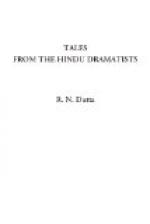DUTANGADA
OR
THE MISSION OF ANGADA.
Angada, the son of Bali, is sent by Rama to Ravana to demand Sita. He executes his mission in a most clever and courageous manner. He then departs from Lanka. Ravana now goes forth to battle and is slain by Rama. The divine hero then enters the city of Lanka in triumph.
PRADYUMNA VIJAYA.
A pair of geese, the Hansa and Hansi inspire Prabhavati, the daughter of Vajranabha, and Pradyumna, the son of Krishna with a mutual passion before they have beheld each other. By their contrivance, secret nuptials are brought about.
The sage Nareda communicates the stolen interviews of the lovers to the father of the damsel, to whose vengeance Pradyumna is about to fall a victim, when Krishna and Baladeva with their followers come to the rescue. A combat ensues in which Vajranabha is defeated and slain. The engagement is seen by two Gandherbas from their chariots in the air.
VIDAGDHA MADHAVA.
The loves of Krishna and Radha are intense. The two lovers often engage in jealous squabbles.
Chandravali, a nymph of Vrindavan, is enamoured of Krishna and thus excites the jealousy of Radha.
The Paurnamasi, the personified day of the full moon, interests herself in the union of Krishna and Radha.
DHANANYAYA VIJAYA.
The cattle of king Virat are carried off by Karna and the Kuru princes. Aryuna recovers them after a great battle. The different chiefs appear, threaten one another and praise themselves.
Indra and some of his attendants contemplate the fight from the clouds.
HASYARNAVA.
The king Anasayindhu, in his progress through his city, regrets to find everything subverted: that Chandals, not Brahmans, make shoes; that wives are chaste and husbands constant; and that respect is paid to the respectable, not to the vile; and that Vyadhisindhu, the doctor, cures the cholic by applying a heated needle to the palate, and perforates the pupils of the eyes in order to restore vision.
Sadhhinsaka, the chief of police, reports with great satisfaction that the city is completely in the hands of thieves; the Commander-in-chief Ranajambuka, after putting on his armour, valiantly cuts a leech in two. Mahayatrika, the astrologer, in answer to a question of the time to take a journey, indicates hours and positions which proclaim approaching death.
A dispute ensues between Viswabhanda, a Saiva mendicant, and Kalahankura, his disciple, which they refer to the decision of Mahanindaka, another Brahman, who asserts that he composed the vedas and visited Swerga, where he treated Vrihaspati and Brahma with contempt and gave Siva a drubbing.




